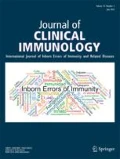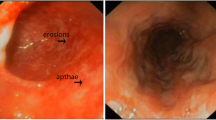Abstract
Introduction
We describe a girl presenting at age 6 years with a history of chronic ulcerating intestinal inflammation since 9 months of age. She exhibited a severe, steroid-dependent clinical course of intestinal inflammation over several years in the absence of serious infections.
Results and Discussion
Immunodeficiency was first considered at 6 years of age due to chronic lymphopenia. Immunophenotyping revealed low B and T cell counts with few naïve T cells, a skewed TCR repertoire, and TCR γ/δ T cell predominance, suggesting a defect of lymphocyte development. Genetic and functional analyses identified a hypomorphic mutation in the DCLRE1C (ARTEMIS) gene compromising V(D)J recombination efficiency, but allowing residual T and B cell development. Hematopoetic stem cell transplantation reconstituted the lymphocyte compartment and cured the inflammatory bowel disease.
Conclusion
This report illustrates that a genetic disorder of lymphocyte development can present with chronic inflammatory bowel disease as the dominant phenotype in the absence of severe infection susceptibility.


Similar content being viewed by others
Abbreviations
- EDA-ID:
-
anhidrotic ectodermal dysplasia with immunodeficiency
- HSCT:
-
hematopoietic stem cell transplantation
- IBD:
-
inflammatory bowel disease
- IPEX:
-
immunodysregulation, polyendocrinopathy, enteropathy, X-linked
- TCR:
-
T cell receptor
- WAS:
-
Wiskott-Aldrich syndrome
References
Glocker EO, Kotlarz D, Boztug K, Gertz EM, Schäffer AA, Noyan F, et al. Inflammatory bowel disease and mutations affecting the interleukin-10 receptor. N Engl J Med. 2009;361:2033–45.
Xavier RJ, Podolsky DK. Unravelling the pathogenesis of inflammatory bowel disease. Nature. 2007;448:427–34.
Powrie F, Leach MW, Mauze S, Caddle LB, Coffman RL. Phenotypically distinct subsets of CD4+ T cells induce or protect from chronic intestinal inflammation in C. B-17 scid mice. Int Immunol. 1993;5:1461–71.
Powrie F, Correa-Oliveira R, Mauze S, Coffman RL. Regulatory interactions between CD45RBhigh and CD45RBlow CD4+ T cells are important for the balance between protective and pathogenic cell-mediated immunity. J Exp Med. 1994;179:589–600.
Shull MM, Ormsby I, Kier AB, Pawlowski S, Diebold RJ, Yin M, et al. Targeted disruption of the mouse transforming growth factor-beta 1 gene results in multifocal inflammatory disease. Nature. 1992;359:693–9.
Kuhn R, Lohler J, Rennick D, Rajewsky K, Muller W. Interleukin-10-deficient mice develop chronic enterocolitis. Cell. 1993;75:263–74.
Bennett CL, Christie J, Ramsdell F, Brunkow ME, Ferguson PJ, Whitesell L, et al. The immune dysregulation, polyendocrinopathy, enteropathy, X-linked syndrome (IPEX) is caused by mutations of FOXP3. Nat Genet. 2001;27:20–1.
Torgerson TR, Ochs HD. Immune dysregulation, polyendocrinopathy, enteropathy, X-linked: forkhead box protein 3 mutations and lack of regulatory T cells. J Allergy Clin Immunol. 2007;120:744–50. quiz 751-2.
Mombaerts P, Mizoguchi E, Grusby MJ, Glimcher LH, Bhan AK, Tonegawa S. Spontaneous development of inflammatory bowel disease in T cell receptor mutant mice. Cell. 1993;75:274–82.
Enders A, Fisch P, Schwarz K, Duffner U, Pannicke U, Nikolopoulos E, et al. A severe form of human combined immunodeficiency due to mutations in DNA ligase IV. J Immunol. 2006;176:5060–8.
Pannicke U, Ma Y, Hopfner KP, Niewolik D, Lieber MR, Schwarz K. Functional and biochemical dissection of the structure-specific nuclease ARTEMIS. EMBO J. 2004;23:1987–97.
Moshous D, Pannetier C, Chasseval Rd R, Deist Fl F, Cavazzana-Calvo M, Romana S, et al. Partial T and B lymphocyte immunodeficiency and predisposition to lymphoma in patients with hypomorphic mutations in Artemis. J Clin Invest. 2003;111:381–7.
de Villartay JP, Lim A, Al-Mousa H, Dupont S, Déchanet-Merville J, Coumau-Gatbois E, et al. A novel immunodeficiency associated with hypomorphic RAG1 mutations and CMV infection. J Clin Invest. 2005;115:3291–9.
Ehl S, Schwarz K, Enders A, Duffner U, Pannicke U, Kühr J, et al. A variant of SCID with specific immune responses and predominance of gamma delta T cells. J Clin Invest. 2005;115:3140–8.
Buck D, et al. Severe combined immunodeficiency and microcephaly in siblings with hypomorphic mutations in DNA ligase IV. Eur J Immunol. 2006;36(1):224–35.
Kumaki S, et al. Identification of anti-herpes simplex virus antibody-producing B cells in a patient with an atypical RAG1 immunodeficiency. Blood. 2001;98(5):1464–8.
Pasic S, et al. Recombinase-activating gene 1 immunodeficiency: different immunological phenotypes in three siblings. Acta Paediatr. 2009;98(6):1062–4.
Karaca NE, et al. Diverse phenotypic and genotypic presentation of RAG1 mutations in two cases with SCID. Clin Exp Med. 2009;9:339–42.
Ege M, Ma Y, Manfras B, Kalwak K, Lu H, Lieber MR, et al. Omenn syndrome due to ARTEMIS mutations. Blood. 2005;105:4179–86.
Peake J, Waugh A, Le Deist F, Priestley A, Rieux-Laucat F, Foray N, et al. Combined immunodeficiency associated with increased apoptosis of lymphocytes and radiosensitivity fibroblasts. Cancer Res. 1999;59:3454–60.
Villa A, Marrella V, Rucci F, Notarangelo LD. Genetically determined lymphopenia and autoimmune manifestations. Curr Opin Immunol. 2008;20:318–24.
Acknowledgements
This work was supported by the Bundesministerium für Bildung und Forschung (BMBF 01 EO 0803). We acknowledge the excellent technical assistance of S. Braun, I. Janz, and E. M. Rump.
Conflicts of Interest
No conflicts of interest exist for any author.
Author information
Authors and Affiliations
Corresponding author
Additional information
Jan Rohr and Ulrich Pannicke contributed equally to this work.
Grant support list
K.S., S.E.: German Ministry of Education and Science (BMBF 01 EO 0803).
Rights and permissions
About this article
Cite this article
Rohr, J., Pannicke, U., Döring, M. et al. Chronic Inflammatory Bowel Disease as Key Manifestation of Atypical ARTEMIS Deficiency. J Clin Immunol 30, 314–320 (2010). https://doi.org/10.1007/s10875-009-9349-x
Received:
Accepted:
Published:
Issue Date:
DOI: https://doi.org/10.1007/s10875-009-9349-x




